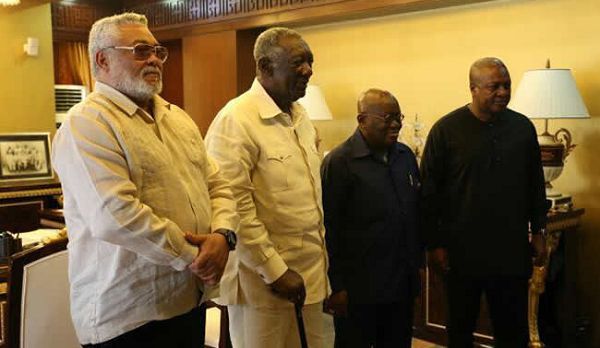
Have we had governments?
I will begin this week with the question I posed in my last paragraph last week: Can we seriously conclude, looking at ourselves, so far, that the Black man is capable of solving his own problems?
At the height of the protracted debate to privatise or not to privatise our urban water supply system, government made a strong case that privatisation (or PSP) was inevitable because the utility – that is, Ghana Water Company Limited – had been mismanaged.
Advertisement
Drawing from experiences in other Third World nations, where “privatisation” has only meant a take-over by North American or western European multi-nationals, the Integrated Social Development Centre (ISODEC), which was spearheading the civil society campaign in Ghana, asked a critical question: “Must we privatise government (by inference, allow some foreigners to take over the Ghana government) because it (our governments) has mismanaged Ghana since 1957?
Recently I have had to repeat the question to myself many times.
The latest was when I read from citinewsroom.com that: “Eighty-six vehicles purchased by the Rawlings administration remain unused after nearly 20 years.
The vehicles have been parked at the Institute of Local Government Studies and have almost become a symbol of government’s misuse of public funds.”
(They have been parked at the institute because they were imported for use by District Chief Executives)
Asked for explanations, the tales never end. First tale says the Gallopers were planned to be swapped for Toyota Pajeros being used by the assemblies and some ministries under a deal brokered by then Local government Minister, Kwamena Ahwoi, before his replacement by Mrs Cecilia Johnson, in the last days of the first NDC government.
Another tale: Governments after NDC-one had failed to reach an amicable settlement with the importers of the vehicles, African Automobile Company Limited.
Third tale: Okudzeto Ablakwa, speaking as Deputy Information Minister, told newsmen that even though the Gallopers were imported by the previous NDC, the NPP government, when it came into office in 2001, ignored outstanding contractual agreements between the government and African Automobile Limited (AAL); thereby incurring one percent interest charge on the vehicles monthly with accompanying demurrages totaling $1.5billion.
In what everybody hoped was going to be the final word on the matter a Deputy Minister of Finance, Kwaku Kwarteng, in an interview with Citi FM, promised Ghanaians that the government had decided to auction the 86 Gallopers before the end of 2018.
Today is May 17, 2019 and the vehicles are still there.
Shocked? Read this.
In 2016, the government secured 245 buses from the Scannia Group of Sweden to operate a bus rapid transport (BRT) system. Some 59 buses were deployed in Greater Accra on the Amasaman-Tudu and Kasoa-Tudu route whilst 60 were sent to Kumasi.
Fast track to 2018, the read was as follows: “More than 170 Aayalolo buses have been grounded at the Achimota bus terminal in Accra for lack of routes on which to ply while another 60 deployed to Kumasi for use are yet to start operations.”
The Greater Accra Passenger Transport Executive (GAPTE), operators of the BRT said at the time: “There is no money to buy fuel and pay the salaries of the drivers and managers”
Unbelievable! Buses are idle in Ghana?
Is it not this country where there is such a shortage of means of commuting that workers get home after 7p.m. to 9p.m. after closing at 5p.m.?
They spend hours in tro-tro queues?
Dear reader, you haven’t heard the last of my litany of woes.
Read this.
On May 3, the Daily Graphic reported that drivers and passengers had virtually abandoned the Achimota Transport Terminal, popularly known as Achimota New Station, in Accra, that was built to reduce road accidents and ease traffic on the dual carriage Accra-Nsawam road.
The terminal is said to be one of the biggest and cleanest in West Africa. It has a clinic, a police station, two passenger halls, passenger sheds, five canteens, toilet facilities and an administration block.
Graphic’s visit to the terminal revealed that the 800-vehicle capacity station constructed at a cost of GH¢4.5 million was being under-utilised. Some mini-buses had lined up but there were no passengers to board them.
All mini-buses (tro-tros) and taxis which had been using the shoulders of the Accra-Nsawam road were expected to use the new bus terminal, but the majority of drivers and passengers have still refused to use the terminal, citing various reasons, including difficulty in accessing the terminal.
They also said it took close to two hours for a bus to fill up, instead of the 20 minutes that they were used to. Because of this, they did not make much money when they operated at the terminal as compared to when they were at the Achimota Old Station.
The final in my litany is a question to Agriculture Minister. How can we talk about success of the Planting for Food and Jobs when the produce are still locked up in the bush and middlemen are taking advantage of farmers?
My question this week is: Do we have a government in this country?
So far, so disappointing, though I think some of Akufo Addo’s policies are worth celebrating; and there are a few people worth celebrating.
I will celebrate Nana Akomea who is making a difference at Inter City STC; Akwasi Agyemang, of Ghana Tourism Authority and Ursula Owusu, Communications Minister




